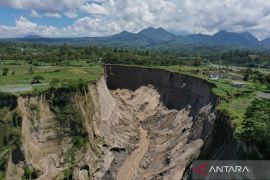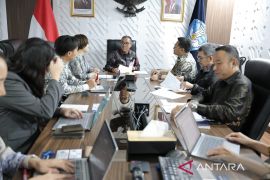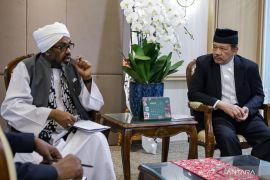Arnold Soetrisnanto, a member of the Energy Technical Commission of the National Research Council, said development of nuclear energy is growing in urgency to cope with the crisis.
"Currently we need nuclear energy. No question about that," Arnold said.
Coal fired power plants could no longer be relied to cope with deficit in power supply in all regions of the country, he said.
"If we rely on coal fired power plant we would need around 200 million tons of coal to meet power requirement all over the country," he said.
He doubted that coal mining companies could guarantee supply of 200 million tons of coal per year to feed the countrys coal fired power plants.
He said regional administrations have often proposed construction of nuclear power plant (PLTN), but the central government has not indicated interest.
Coordinator of governors in Kalimantan once sent a letter to former President Megawati proposing construction of PLTN in that region, he said.
"Now all governors of Sumatra have signed a similar letter for President Jokowi (Joko Widodo). We are awaiting an answer. I think there are already many such proposals, but I dont understand, what holds the president from making an immediate decision on the proposals," he said.
Strong Commitment
Arnold, a member of the Indonesian Nuclear Community (HIMNI) said the central government needs a strong commitment in planning and building PLTN.
"All infrastructure of the countrys first PLTN has been ready. We need only a decision of the central government," he said.
In term of infrastructure, Indonesia is better prepared than Vietnam to build a PLTN, but the government of Vietnam has stronger interest in building the facility, he said.
Vietnam plans to build two units of PLTN in cooperation with Russia.
Arnold said Indonesia already meets 17 of 19 IAEA standards for nuclear infrastructure set by the "International Atomic Energy Agency" (IAEA).
"Vietnam has met only 12 of the IAEA standards, but they already go nuclear," he said.
Long term benefit
The government needs to be convinced of the urgency of developing PLTN, and its long term benefit, Arnold said.
The government must not think of short term benefit in economy from technology development program, he said.
"If we think of short term gain from development of technology we would never make progress," he said.
He said the cost of building a PLTN is not as expensive as developing solar energy.
"The cost of developing solar energy is around 25 US cent per KwH as against only 10 US cents per KwH of nuclear energy. Why the option (nuclear option) is not acceptable," he said.
In addition nuclear energy is clean, he said, adding unlike coal, nuclear energy has no emission of carbon dioxide (CO2).
"Therefore, Indonesia should develop nuclear energy for long term requirement. Unfortunately we have opted for coal-fired power plants," he added.
Public Acceptance
Plan to build a PLTN would need not only governments commitment but also support from the community.
The National Nuclear Energy Agency (Batan) said the public fear of nuclear radiation has blocked program to build the countrys first nuclear power plant.
An executive of Russias Rosatom for Southeast Asia Arkady Karneev also said public fear of nuclear disaster often hamper development nuclear technology in Southeast Asia.
The people reject nuclear technology on lack of knowledge and the myth of nuclear radiation Karneev said.
The people, therefore, need more education and socialization of nuclear energy and benefits have to be intensified, he said.
Rosatom has succeeded in convincing people in Vietnam of the benefit of developing nuclear technology, before building a PLTN in in Ninh Thuan, Vietnam.
The Indonesian government could adopt the Russian method of socialization to gain public acceptance of nuclear energy development, he said.
In fact the people begin to accept plan to build PLTN. Growing number of regional administrations have proposed development of PLTN.
Finally it would be up to the central government, he said.
Vietnam going nuclear.
Vietnam would be the first country in this region to have nuclear power plant (PLTN).
The government of Vietnam said it would cooperate with Russia to build two units of PLTN in the province of Ninh Thuan before 2020.
"Before 2020, Vietnam would build PLTN in the province of Ninh Thuan," Deputy director of the Management Council of the Ninh Thuan Nuclear Energy Project, Nguyen Manh Hung said.
Nguyen was speaking on the sidelines of a workshop with theme of "Public Acceptance of Nuclear Technologies: Sharing Asian Experience" in Phan Rang - Tap Cham, Vietnam on 13 November.
Manh Hung said a feasibility study has been made on the project in Ninh Thuan and the result of the studies had been handed over to the government for approval.
He said approval is expected in 2016 that technical design could start.
Manh Hung said the project would be financed with a loan from the Russian government to be repaid after the PLTN is in operation for 19 years.
He said the people of Vietnam welcome the project, adding, there was almost no resistance to the plan.
Therefore, through cooperation with the Russian state company Rosatom, Vietnam would be one among many countries already having nuclear power plants.(*)
Reporter: Yuni Arisandy
Editor: Heru Purwanto
Copyright © ANTARA 2015











